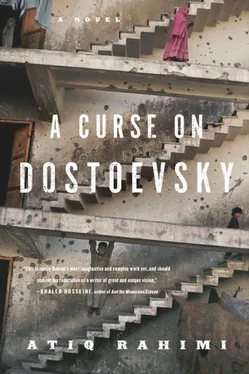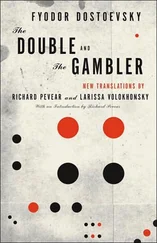Here, in front of you, in your room. Open your eyes!
Barely awake, Rassoul scrambles to his feet, knocking the copy of Crime and Punishment off his chest. “Razmodin?” His cousin’s name trembles on his lips and is lost. He coughs and pretends to say “Salam.” Razmodin, who is crouching nearby, looks at him anxiously.
“Are you all right, cousin?”
Rassoul opens his eyes wide, then closes them again thoughtfully. Razmodin insists. “What’s going on? Are you well?”
Rassoul nods his head and sits down on the mattress, gazing at the broken window. It is already day but the sky is still black, black with smoke. “Do you want me to take you to a doctor?” No, it’s OK, he gestures. “Yes, I can see that! Tell me what’s going on!” Razmodin’s worried gaze lingers on Rassoul’s shirt. “What is that blood? Did they beat you up?”
After a moment’s thought, Rassoul stands up to look out at the courtyard, and sees Yarmohamad watching him. He beckons him to come up. But the landlord goes back inside his own house. “Leave him alone! He came to my office at dawn and told me everything. He was pale and kept telling me it wasn’t him… And that’s the truth. There are patrols everywhere, these days. Especially in this neighborhood… You’ve no idea what’s going on in this country right now. Buried in who-knows-what world, you have no interest…” Stop, Razmodin, please! Look what they’ve done to him.
Razmodin stops, not to notice the state Rassoul is in, but to hear him explain himself. He waits a moment. Nothing. He can’t believe it. Rassoul rolls up his sleeves to reveal his bruises. “What sons of bitches! But you’re a madman, too. What are you doing with all these Russian books in times like this?” Rassoul’s ankle starts hurting again. He grimaces and sits back down on the bed to rub it. His cousin stares down at him. “Dostoevsky! Dostoevsky! You’re always getting in trouble with your damned Dostoevsky! How do you expect them to know who he is?”
They aren’t all as ignorant as you, Razmodin! Commandant Parwaiz, whose name I’m sure you know, is very familiar with Dostoevsky. His troops are based just opposite your place, in the Ministry of Culture and Information. But in my current state, I am not able to tell you about it.
Write it down!
What’s the point? It’s more peaceful like this, without words, without all these endless conversations. I’ll just leave him to wonder at my mute state.
“Yarmohamad told me that they took you to Commandant Parwaiz’s office. I know him.” So you were right. “We were imprisoned together during the 1979 protests. That was a stroke of luck, being sent to him. Did you mention my name?” Rassoul shakes his head, then stands up to lurk behind the window once more. Yarmohamad is back in the courtyard. Rassoul beckons again for him to come over. “Forget him, it’s done. I paid him the two months’ rent you owed, he’ll leave you alone now.” Distressed by his cousin’s generosity, Rassoul totters back to his bed and attempts to communicate in sign language that he shouldn’t have done it, that he, Rassoul, would have paid it… The same words he’d used last time, when Razmodin paid three months’ rent on his behalf.
“And what exactly would you have paid it with?! You’ve let everything drop. Look at the state of you. You look like a beggar, or a madman escaped from an asylum!” Razmodin would have said, again.
So there is no point in Rassoul going to such lengths to make himself understood. But Razmodin expects to hear it from Rassoul. He can’t understand why he won’t talk to him. He looks on curiously as Rassoul stands up and rummages through a mound of clothing, looking for a clean shirt. They are all dirty and rumpled. Rassoul knows that. He is just pretending, so he doesn’t have to respond to Razmodin. The thing is, he doesn’t want him to know that he has lost his voice. They are cousins, and know each other well. They can hear each other’s thoughts, even when they are unspoken. Despite this, Razmodin insists as he always does.
“Rassoul, you’ve got to do something. How long are you going to live like this? If I could speak the languages you can, I’d have earned buckets of cash by now. These foreign journalists and humanitarian organizations are all crying out for interpreters. Every day, a hundred times a day, people ask me if I know someone who speaks even a little English. But how can I give them your name? You’ve already landed me in the shit. I’ve regretted it a dozen times.” And again, he will forgive him. “If you want, you can put the past behind you and start again. But I beg you, cousin, stop being so aggressive with the journalists. What business is it of yours who works for who, or why they are defending this or that group? Just take the dollars—fuck them and their ideas and shitty political posturing!” But this time, he doesn’t wait for Rassoul to bend his ear with his usual motto: “I’d rather be a murderer than a traitor!” Instead, he continues: “It’s easy to say that you’d rather be a murderer than a traitor. Why don’t you carry a gun then? You’re burying your head in the sand. If you’re asked to fly, you say you’re a camel, and if you’re asked to carry, you say you’re a bird. You’ve dropped your parents, forgotten your sister and your friends. If you want to fuck everything up then just carry on as you are. Do you even know what you want from life?” Furious, he stands up, takes a cigarette from his pocket and lights it. Despite his annoyance at these repeated reproaches, Rassoul is still pretending to look for a shirt, while nodding his head and drawing circles in the air with his hand to signal that he knows what’s coming.
“I swear, you’ve changed, you’re no longer the same man. You wanted Sophia, you got her. But what are you doing with her now? Do you want her to meet the same fate as you? We grew up together, cousin, we know each other, you’re like my brother. You taught me everything…” Razmodin doesn’t finish the sentence, because when he made the same speech—or nearly—a few weeks ago, Rassoul snapped: “Except for one thing.”
“What?”
“The horror of a moral lecture.”
“I’m not trying to lecture you. I’m holding up a mirror.”
“A mirror? No, it’s the bottom of a glass that bears only your own face, and which you hold up to others in order to say Be like me! ”
Better to shut up, Razmodin. You think I’m pretending not to give a fuck about what you’re telling me. It’s a good thing you don’t know that I’m condemned to silence, or you’d still be speaking. You’d have emptied out your heart, bilious from my previous insults, without hearing me say that I don’t want your charity, I don’t like your fleamarket humanitarians, I hate these philanthropists who only care about their own name, I can’t stand all these buzzards circling above our corpses, these flies buzzing around the arsehole of a dead cow. Yes, I hate everything now: myself, and you too, my cousin, my childhood friend—you who are looking into my eyes, waiting for me to say something. Well, you won’t hear anything from me now. Perhaps you think this silence is a sign of indifference toward you. Or else resignation to your recriminations.
Interpret it how you will. What difference will that make to the world? To me? None. So just leave me alone!
After this long silence, Razmodin attacks again: “So now you won’t speak to me anymore? It’s all over?” Rassoul stops rummaging through his clothes. He shrugs his shoulders to show that he has nothing left to say. Disappointed, Razmodin stands up. “You’ve really lost it now, Rassoul. If you don’t want to see me anymore, or listen to me, then I’m off…,” he heads toward the door… “the fact that I paid the rent was just to protect our family’s honor. That’s it!” and he leaves.
Читать дальше












